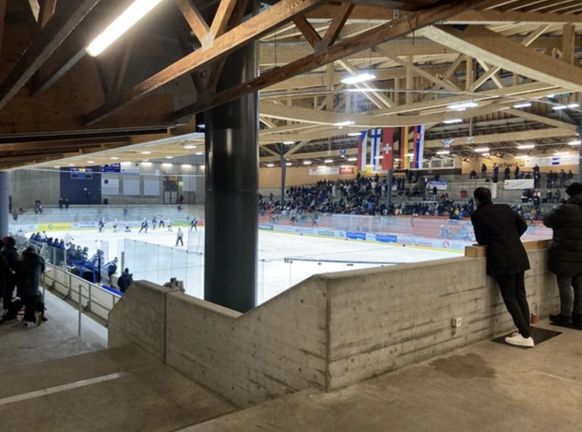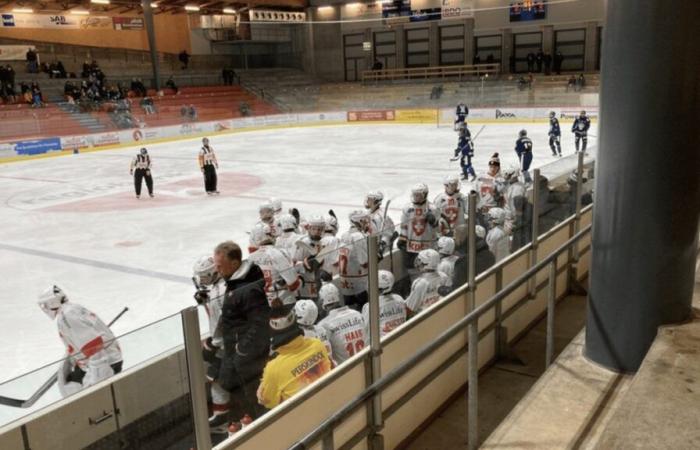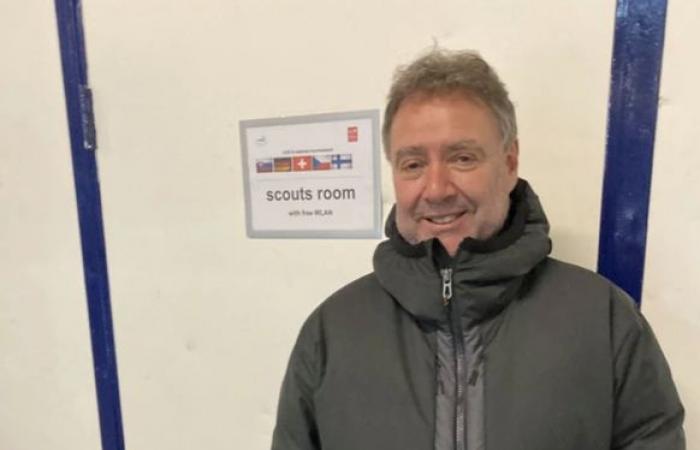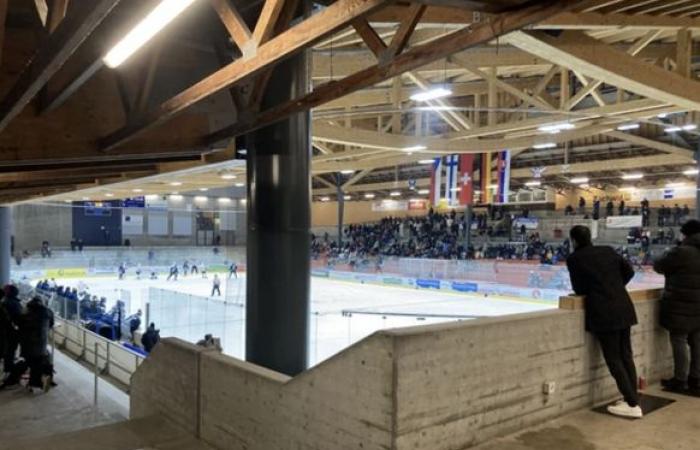The Five Nations Tournament took place at the end of December in Zuchwil in the canton of Solothurn.image: klaus zaugg
Organized in the canton of Solothurn between Christmas and New Year, the Five Nations tournament, followed very closely by the NHL franchises, and therefore particularly interesting from a sporting point of view, bears no resemblance to the Spengler Cup which has become almost obscene. It’s there, in Zuchwil, that “real” hockey takes place during the holidays.
Klaus Zaugg
The parking lot in front of the arena is not only free, but it is also not crowded. There is almost no one there, so much so that the cawing of the crows perched on the nearby trees would be almost disturbing on this foggy December night. It feels like a horror movie.
But don’t worry: life remains peaceful on the Plateau. The journalist is on his way to the most important “hockey” event of the last week of the year. And no, it’s not the legendary Davos competition. We are talking here about the U18 tournament of the five nations at the Regiobank Arena in Zuchwil in the canton of Solothurn. An alternative Spengler Cup, or to put it in a much more controversial way: an anti-Spengler Cup.
Yet even the best young talents from Switzerland, Slovakia, Czech Republic, Finland and Germany are not present. They are already integrated into the teams currently competing in the Under-20 World Championship. This is the case of Jonah Neuenschwander from Bienne, who is certainly old enough to be here, but who is traveling to Canada. He therefore does not play in front of the 50 NHL recruiters who came to Switzerland to observe the new generation. For the occasion, the ice rink refreshment bar was transformed into a work room with Internet access for talent scouts.
Note that there are no talent scouts.
Why such an armada? The Solothurn international tournament is full of gems to discover, unlike the Junior Worlds, which welcomes players that recruiters already know perfectly. Very great talents in some cases, likely to be cited soon in the first or even second round of the NHL draft.
However, for a team to achieve long-term success, it must not only make the right choices during the first rounds, those where it finds future stars. She must also select the right players in the fourth, fifth, sixth or seventh round of the draft. If a franchise manages to secure good hockey players at these levels, it then acquires a completely different standing. This is why it is so important to know the second knives. A tournament like the one in Zuchwil is therefore very important for young talents, eager to show their potential. Even those not selected for the U18 or U20 World Cups can appear in the recruiters’ notebooks.
A specialist in the European market, Thomas Roost works as a scout for the NHL central office, whose role is to establish the list of the most talented players and provide clubs with reports on the nuggets. It is therefore logical to see him prefer the Solothurn mist to the Davos sun.
Thomas Roost in front of the entrance to the refreshment bar which became the “Scouts Room” for a few days.image: klaus zaugg
“Zuchwil is more important than the U18 or U20 World Championship for all NHL scouts. It is likely that more than 50 of them came here,” says Roost. Recruiters only pay 40 francs to use the work space and the fact that they invade the refreshment bar does not cause any quarrel. A sausage stand has been set up right next to the room. These are perhaps the best you can taste in an ice rink.
Thomas Roost, recognized for his international work, also holds the position of sports director at HC Olten. The opportunity to discuss a little about the club’s sporting policy. The journalist is convinced that the problem comes from the two goalkeepers. Roost didn’t contradict him, but he also didn’t reveal what he planned to do about it. It’s just a parenthesis.
The trip to Zuchwil is also a journey to the origins of our sport. It’s a return to basics, in short, we find the base without which professional hockey would not exist. Everything here revolves around the game. Many volunteers ensure that the organization is perfect. There is no sales despite the presence of recruiters, no marketing.
Pure romance!
The ticket for a match costs ten francs. That’s 20 times less than a seat at the Spengler Cup. The spectators are also fewer in number. There were a little more than 400 on Sunday evening for the match between Switzerland and Finland. Among them, some have a subscription to a National League ice rink. They used to go to Davos for the traditional Spengler Cup, but today come to take advantage of the alternative offered in Zuchwil. There they lead a pilgrimage in favor of “real” hockey and against capitalism, which has become almost obscene in Davos. It’s like shopping on the farm rather than in a supermarket.
The budget of course has a lot to do with it. A night in a hotel near Zuchwil cost less than 150 francs on the evening of Switzerland-Finland, when the same night in Davos was on sale for 700 francs, and that for a shabby room.

The Zuchwil ice rink during the Five Nations tournament.image: klaus zaugg
The Solothurn competition has existed for almost 20 years. A curiosity as annoying as it is moving shows to what extent there is only hockey here, and not the slightest place given to money. The meeting ends. The Swiss, who had resisted for a long time, lost sharply 11-2 against the Finns, after a complete breakdown in the last third. It’s a fast, entertaining, wild match with no real tactical plan.
“Champagne” hockey like the Spengler Cup.
A debriefing between friends, embellished with all kinds of anecdotes, is however not possible like in the immense “Timeout” restaurant at the Davos ice rink. Immediately after the match, a young woman closes the enclosure and we are outside in the cold Zuchwil night. However, it is only 9 p.m. But at this late hour, everything is closed, international tournament or not. In short, the order must be respected.
That’s when we realize that there is only hockey at the Five Nations Tournament, and no gastronomy, or worse yet, VIP services. Money plays no role. After all, the financing of the young U18 team is provided by the federation with its already deep pockets.
More sports articles
Show all articles








